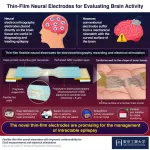(Press-News.org) A model to map energy demand down to street level shows cooling demand in the capital grew by 5% per year between 1980 and 2022 as summers heat up.
The Demand.ninja model, created by researchers at Imperial College London and TU Delft, was designed to show how the weather influences hourly energy consumption in buildings. It can also account for changes in demand as the climate changes, including the increase in cooling demand in the summer as heatwaves become more common and more intense.
Countries like the UK are traditionally unprepared for extreme heat. Events like 2022’s 40°C heatwave caused sales of air conditioning (AC) units to skyrocket – a trend that is likely to accelerate as heatwaves become more frequent. Rising demand for cooling is a lose-lose for homeowners and the climate as ACs increase electricity consumption leading to higher energy bills and greater emissions.
The USA, which has much hotter summers and more widespread AC infrastructure, is now consuming an additional 66 TWh of electricity per year for air conditioning than it did just a generation ago due to rising summer temperatures – more than the entire electricity demand of Switzerland.
Security, affordability, climate
The model can also show the potential of behaviour change to reduce energy consumption. For example, if every building in Europe turned their thermostat down by 1°C, the continent would save 240 TWh of natural gas per year, approximately a sixth of historical imports from Russia. This benefits both energy security and the climate: carbon emissions savings would be equivalent to taking Europe’s two largest coal power plants offline.
Nathan Johnson, from the Centre for Environmental Policy at Imperial, said: “Since Russia's invasion of Ukraine, Europe has been racing to reduce gas consumption to avoid shortages and lower consumers’ bills. If all buildings across Europe lowered their temperature by 1°C, this would cut the cost of imports by €22 billion per year and cut CO2 emissions by nearly 50 million tonnes per year: a win-win-win for energy security, affordability and the climate.”
The model uses 40 years of meteorological data from NASA on local air temperature, humidity, solar radiation and wind speed to estimate the temperature that occupants feel when inside a building. This ‘feels like’ temperature is then used to predict energy demand by training the model using measurements of energy demand at the national, regional and individual building level.
The result is a model that can predict hourly energy demand with high fidelity at any spatial scale. The details of the model are published today in the journal Nature Energy.
Keeping the world comfortable
High-resolution data on energy demand can help energy system planners model future scenarios with the adoption of new technologies and user behaviours, and plan infrastructure upgrades at a scale ranging from individual streets to entire countries, such as the impact of the addition of heat pumps and electric vehicles to the grid.
It can also help in answering global questions, such as how much energy the world needs for everyone to be comfortable – to be warm enough in winter and cool enough in summer. More than five million deaths per year (nearly 10% of global mortality) are associated with excess cold (4.6 million) and heat (0.5 million).
For example, heat-related fatalities start to rise when temperatures reach a daily average of 27°C, and the model can show how often and where this has occurred over the past 40 years to help understand where interventions to prevent this tragic loss of life are best targeted.
Lead researcher Dr Iain Staffell, from the Centre for Environmental Policy at Imperial, said: “Accurate modelling of the impacts of weather on energy supply and demand is critical to decarbonising power systems. We are making the Demand.ninja open for anybody to use, which we hope will open up new possibilities for researchers, for example when looking at how to operate 100% renewable grids, or the impact of heat waves and heat pumps on peak electricity demand.
“This isn’t just about energy, it’s a major global health issue. More than five billion people experience over 100 additional cooling degree days per year compared to a generation ago. A successful global energy transition will depend in part on understanding where, when and how much energy is required to close the gap in heating and cooling.”
END
London has the fastest increase in cooling demand in the world, shows new model
2023-09-14
ELSE PRESS RELEASES FROM THIS DATE:
New research signals a quantum leap for brain tumour treatment
2023-09-14
Researchers have discovered a new way to target and kill cancer cells in hard-to-treat brain tumours using electrically charged molecules to trigger self-destruction, that could be developed into a spray treatment used during surgery.
A multidisciplinary team of researchers from the University of Nottingham, led by the School of Pharmacy found a new way to harness the extraordinary capabilities of bio-nanoantennae—gold nanoparticles intricately coated with specialised redox active molecules to induce programmed cell death, or apoptosis, in cancer cells on electrical stimulation. The research ...
Use of physical therapy and subsequent falls among patients with dizziness
2023-09-14
About The Study: The findings of this study of 805,000 patients ages 18 or older suggest that receipt of physical therapy (PT) after presentation for dizziness was associated with a reduction in fall risk during the subsequent 12 months; thus, timely PT referral for dizziness may be beneficial for these patients. Future research, ideally with a clinical trial design, is needed to explore the independent impact of PT on subsequent falls for adults with dizziness.
Authors: Meredith E. Adams, M.D., M.S., of ...
Geographical variation in social determinants of female breast cancer mortality across US counties
2023-09-14
About The Study: The results of this study of 2,176 counties suggest that breast cancer mortality in the U.S. can be affected by where individuals live, and that more comprehensive and geographically targeted interventions may lead to healthier communities.
Authors: Taylor Anderson, Ph.D., of George Mason University in Fairfax, Virginia, is the corresponding author.
To access the embargoed study: Visit our For The Media website at this link https://media.jamanetwork.com/
(doi:10.1001/jamanetworkopen.2023.33618)
Editor’s Note: Please see the article for additional information, including other authors, author contributions ...
Combination immunotherapy treatment effective before lung cancer surgery
2023-09-14
Combination immunotherapy with the anti-PD-L1 monoclonal antibody durvalumab and other novel agents outperforms durvalumab alone in the neoadjuvant (pre-surgical) setting for early-stage non-small-cell lung cancer (NSCLC), according to researchers at The University of Texas MD Anderson Cancer Center.
The findings, published today in Cancer Discovery, were first presented at the American Association for Cancer Research (AACR) Annual Meeting 2022.
The multicenter, randomized Phase II NeoCOAST clinical trial evaluated neoadjuvant durvalumab alone ...
Verbal nonsense reveals limitations of AI chatbots
2023-09-14
NEW YORK – The era of artificial-intelligence chatbots that seem to understand and use language the way we humans do has begun. Under the hood, these chatbots use large language models, a particular kind of neural network. But a new study shows that large language models remain vulnerable to mistaking nonsense for natural language. To a team of researchers at Columbia University, it’s a flaw that might point toward ways to improve chatbot performance and help reveal how humans process language.
In a paper published online today in Nature Machine Intelligence, ...
Revolutionizing brain monitoring and stimulation with thin-film neural electrodes
2023-09-14
Flexible thin-film electrodes placed directly on brain tissue show promise for the diagnosis and treatment of epilepsy, as demonstrated recently by scientists at Tokyo Tech. Thanks to an innovative yet straightforward design, these durable electrodes accurately match the mechanical properties of brain tissue, leading to better performance during electrocorticography recordings and targeted neural stimulation.
Measuring brain activity is a useful technique for diagnosing epilepsy and other neuropsychiatric disorders. Among the several approaches adopted, electroencephalography (EEG) is the least invasive. During EEG recordings, electrodes ...
Researchers present novel principle for nitric oxide-mediated signalling in blood vessels
2023-09-14
Although a simple molecule, nitric oxide is an important signal substance that helps to reduce blood pressure by relaxing the blood vessels. But how it goes about doing this has long been unclear. Researchers at Karolinska Institutet in Sweden now present an entirely novel principle that challenges the Nobel Prize-winning hypothesis that the substance signals in its gaseous form. Their findings are presented in the journal Nature Chemical Biology.
That the simple molecule nitric oxide or nitrogen monoxide (NO) serves as a signal substance in many important physiological processes has been known for some time. For example, the discovery of the compound’s ...
Electrons from Earth may be forming water on the Moon
2023-09-14
A team of researchers, led by a University of Hawai‘i (UH) at Mānoa planetary scientist, discovered that high energy electrons in Earth’s plasma sheet are contributing to weathering processes on the Moon's surface and, importantly, the electrons may have aided the formation of water on the lunar surface. The study was published today in Nature Astronomy.
Understanding the concentrations and distributions of water on the Moon is critical to understanding its formation and evolution, and to providing water resources for future human exploration. The new ...
New tool can reveal inequitable distribution of ‘healing’ green spaces
2023-09-14
Areas in Vancouver with the greatest need for restorative nature often have the least exposure to it, according to a new UBC study published recently in Ambio. These neighbourhoods include Strathcona, downtown Vancouver, the West End, southern Sunset and Marpole.
The researchers developed a new tool, the local restorative nature (LRN) index to assess spaces for the presence of qualities that promote mental well-being. While initially applied in Vancouver, the index can also be used in any urban landscape, according to lead author Dr. Tahia Devisscher, an assistant professor in the faculty of forestry.
We sat down with Dr. Devisscher to discuss the study findings and ...
Many don’t know key facts about US Constitution, Annenberg study finds
2023-09-14
PHILADELPHIA – Many Americans do not know what rights are protected under the First Amendment and a substantial number cannot name all three branches of government, according to the 2023 Annenberg Constitution Day Civics Survey.
The Annenberg Public Policy Center’s annual, nationally representative survey finds that when U.S. adults are asked to name the specific rights guaranteed by the First Amendment to the Constitution, only one right is recalled by most of the respondents: Freedom of speech, ...





